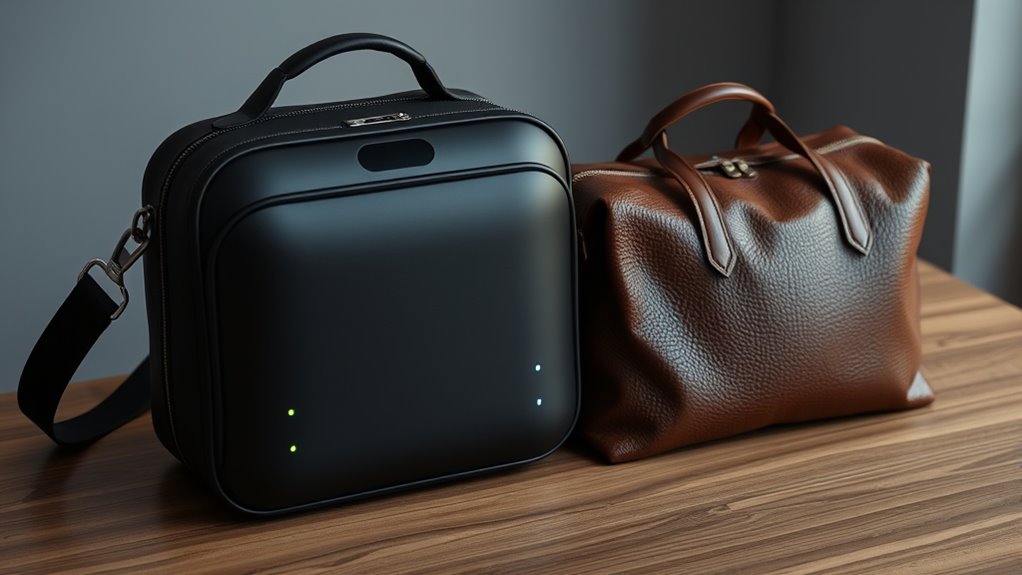If you’re weighing smart bags against traditional ones, consider what matters most to you. Smart bags offer handy features like charging ports and GPS, making life more convenient. However, they tend to be less durable and stylish than classic bags made of leather or canvas. If convenience outweighs longevity or timeless style, smart bags could be worth it. Curious? Keep exploring and discover how these differences might fit your personal needs.
Key Takeaways
- Smart bags offer convenience with features like charging ports and GPS, but may compromise durability due to electronic components.
- Traditional bags excel in durability and timeless style, often providing better long-term value despite lacking tech features.
- The technological features in smart bags appeal to tech-savvy users but can require careful handling and higher maintenance.
- Style versatility favors traditional bags, which suit various occasions, while smart bags tend to have a modern, limited aesthetic.
- The higher cost of smart bags may be justified for added convenience, but traditional bags generally offer better durability and cost-effectiveness.

When choosing between a smart bag and a traditional bag, you might find yourself weighing convenience against simplicity. Smart bags come packed with technology—built-in charging ports, GPS tracking, and even app connectivity—that promise to make your life easier. But are these features worth the trade-offs? One of the first aspects you’ll want to deliberate is durability. Smart bags often incorporate electronic components, which can make them more susceptible to damage from water, impacts, or rough handling. You might notice that, despite their innovative features, some smart bags aren’t quite as tough as traditional bags, which have long been designed to withstand daily wear and tear. Traditional bags typically use sturdy materials like leather, canvas, or nylon, which have well-documented durability comparisons. These materials often age gracefully, maintaining their appearance over time and offering a level of reassurance that your bag will last through various adventures.
Additionally, considering the material quality of the bag can significantly impact its lifespan, especially when electronic features are involved. On the other hand, fashion versatility is another key factor. Traditional bags have a timeless appeal, easily matching different outfits and occasions. They come in a wide array of styles, colors, and sizes, allowing you to select something that fits your personal aesthetic without fuss. Smart bags, while increasingly stylish, tend to lean toward a modern, tech-forward look. They might appeal to a tech-savvy crowd or those who want to make a statement, but their aesthetic options can sometimes be more limited. If you’re someone who values classic versatility—an accessory that seamlessly transitions from work to evening events—you might find traditional bags more adaptable. Conversely, if you love integrating technology into your daily wardrobe and don’t mind a more contemporary style, a smart bag can add a sleek, innovative touch to your look.
Ultimately, your decision hinges on how much you value convenience versus tradition. Smart bags excel when it comes to features that simplify your routines, like keeping devices charged or locating your bag easily. But they often come with a higher price tag and may require more careful handling. Traditional bags offer proven durability and a broad fashion appeal, making them reliable companions for many years. If durability comparisons are your priority, classic materials tend to outperform tech-integrated options in longevity. When it comes to fashion versatility, traditional designs generally offer more flexibility to match various styles. Weigh these factors carefully based on your lifestyle, preferences, and how much you’re willing to invest in the latest tech for the convenience it promises.
Frequently Asked Questions
How Long Do the Batteries in Smart Bags Typically Last?
The batteries in smart bags typically last between 3 to 7 days of regular use, depending on the battery longevity and how often you need to charge them. You might find yourself needing to charge your smart bag every few days if you use its tech features frequently. To keep it ready, plan for regular charging and consider models with longer-lasting batteries to reduce charging frequency.
Are Smart Bags More Secure Against Theft Than Traditional Bags?
Yes, smart bags offer better security against theft than traditional bags. Their built-in tech features, like GPS tracking and smart locks, help prevent theft and make recovery easier if it happens. You can monitor your bag’s location through your phone, reducing security concerns. These advanced features give you peace of mind, making smart bags a smart choice if you’re worried about theft prevention and keeping your belongings safe.
Can Smart Bag Features Be Disabled or Customized?
Like a chameleon changing colors, smart bag features can often be disabled or customized. You can typically turn off functions through a dedicated app or control panel. Many smart bags offer removable batteries for easy maintenance, and customizable settings let you tailor features to your needs. This flexibility guarantees you control your bag’s tech, making it simple to disable features or adjust them for convenience or security.
What Is the Typical Weight Difference Between Smart and Traditional Bags?
You’ll notice that smart bags tend to be slightly heavier than traditional bags, mainly because of added tech components and batteries. The weight comparison varies depending on materials used—smart bags often incorporate durable plastics or metal parts, making them a bit bulkier. Overall, expect a difference of around 1 to 3 pounds, depending on the bag’s size and features. This extra weight is usually manageable but worth considering if you prefer lightweight options.
Are There Warranty and Repair Services Specific to Smart Bags?
Yes, smart bags often come with warranty policies and repair options tailored to their tech components. You’ll typically find coverage for issues like faulty batteries or electronic malfunctions, and manufacturers may offer repair services or replacements for defective parts. It’s smart to review the warranty policies before purchasing, so you’re aware of what’s covered and how to access repair options if your smart bag encounters problems.
Conclusion
Ultimately, whether a smart bag is worth it depends on your lifestyle and priorities. While tech features like GPS tracking and charging ports add convenience, they often come with higher costs and potential durability concerns. Some argue these features are just gadgets that can distract from simpler, more reliable traditional bags. Before choosing, weigh the benefits against the risks—sometimes, sticking with a classic bag offers peace of mind and lasting value, proving that simplicity can still be smart.









